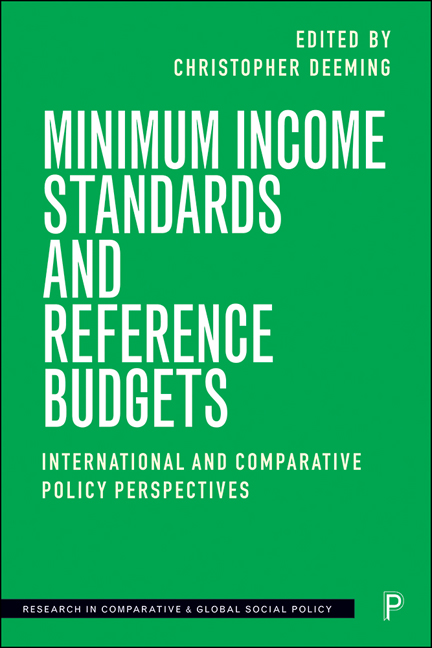1 - An Introduction to Minimum Income Standards and Reference Budgets: International and Comparative Policy Perspectives
Published online by Cambridge University Press: 12 March 2021
Summary
Introduction
Welcome! This volume is a celebration of today's research effort developing ‘minimum income standards’ and ‘reference budgets’, also known as ‘family budget standards’, ‘indicative budgets’ and ‘standard budgets’, i.e. the baskets of goods and services that are considered necessary to reach a minimum standard of living for an individual or household within a given country context, region or city. In other words, how much money is needed or, how much is enough?
The volume is a much needed and long overdue international collaboration and fresh critical reflection on the state of the art written by experts in this field. It brings together up-to-date and accessible information and analysis in an effort to raise the profile and understanding of reference budget research, and put minimum income standards firmly at the heart of global social policy debates that focus on strengthening social protection systems.
The timing is important from a policy and practice point of view. This essential review of learnings to date and future prospects for research is all the more relevant in light of the coronavirus (COVID-19) pandemic, with the current crisis testing health and social protection systems and social security safety nets around the world. In an effort to promote inclusion, international organisations such as the European Commission (EC), the World Health Organisation (WHO) and International Labour Organization (ILO) have been calling on international and domestic policy makers to guarantee the minimum right to adequate social protection in order to prevent poverty and not just alleviate it. Everyone around the world should enjoy at least basic income security according to the ILO and WHO (ILO/WHO, 2011). The WHO recommends (Recommendation 7.2) national governments should now develop and implement economic and social policies that provide secure work and a living wage that takes into account the real and current cost of living for health, and (Recommendation 8.1) governments, where necessary with help from donors and civil society organisations, and where appropriate in collaboration with employers, build universal social protection systems and increase their generosity towards a level that is sufficient for healthy living (CSDH, 2008). While the European Parliament (EP) and EC has called upon European Union (EU) governments (October 2008) to establish active inclusion policies including adequate minimum income support (EP, 2009).
- Type
- Chapter
- Information
- Minimum Income Standards and Reference BudgetsInternational and Comparative Policy Perspectives, pp. 3 - 24Publisher: Bristol University PressPrint publication year: 2020



